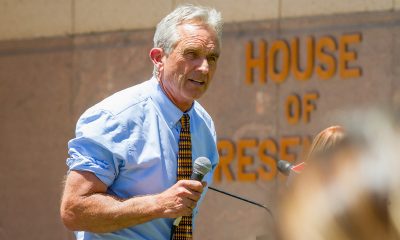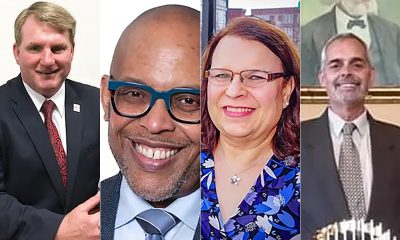Sports
Baseball Chapel spreads evangelical zeal in major, minor leagues
Christian chaplaincy group takes no stance on LGBT issues but doctrine murky

Baseball and evangelical Christianity have a long history in the U.S. (Photo by Bill Andrews via Wikimedia)
Baseball and white evangelical Christianity have a long history going back to the days of Billy Sunday (1862-1935), an outfielder in the game’s National League in the 1880s who went on to become widely accepted as the “most celebrated and influential American evangelist during the first two decades of the 20th century,” according to a 1955 biography.
Sunday converted to Christianity and in 1891 turned down a lucrative baseball contract to go into full-time ministry with a Chicago YMCA. Although Sunday was ordained by the Presbyterian Church and his revival meetings were nondenominational, he was a strict Calvinist and taught traditionally evangelical and fundamentalist doctrine such as the inerrancy of scripture and that one must be saved to avoid hell.
The links between white evangelical Christianity and “America’s pastime” continue today through organizations such as Baseball Chapel, a group that appoints team chapel leaders to provide chaplain-like services to players in both Major and Minor League Baseball to “bring encouragement to people in the world of professional baseball through the gospel so that some become discipled followers of Jesus Christ.”
According to the group’s website, chapel programs are established for all 210 teams in the major and minor leagues and many independent league teams. About 3,000 players, coaches, managers, trainers, office staff and other team personnel, umpires and members of the media attend. The agency was formed in 1973 when Watson Spoelstra, a Detroit sportswriter, approached Commissioner Bowie Kuhn with the idea of an organized chapel program for every major league team. By 1975, all major teams had a chapel program. The minor league component was started in 1978, according to the Baseball Chapel website.
All board members and staff, paid and volunteer, agree to the group’s statement of faith “without reservation,” its website notes.
White evangelical Christianity has evolved in the U.S. and there are varying views as to its origins, although it’s a relatively recent phenomenon in the history of the Christian faith. There was greater overlap of belief with mainline strains of the faith (e.g. Lutheran, Methodist, Episcopal) in the early 20th century but a starker line was drawn in the 1980s when Jerry Falwell’s Moral Majority linked itself to the Republican Party. There was overlap with the Jesus Movement — conservative Christianity’s answer to the Woodstock era — where the born again experience was emphasized and eventually a full-on counterculture formed with books, movies, and especially pop- and rock-flavored gospel music created by and for this audience. These products existed to a far greater degree than anything comparable in mainline or Catholic Christianity.
Today, just 34 percent of white U.S. evangelicals support same-sex marriage (numbers are higher among 18-29 year olds but lower overall in the Bible Belt) compared to 67 percent of white U.S. mainline protestants and 66 percent of white U.S. Catholics, according to the Public Religion Research Institute. And white evangelical support of President Donald Trump is at an all-time high, according to the same group — in an April poll, 75 percent held a positive view of the president (81 percent of among white evangelical U.S. men). Trump won the white evangelical vote by more than 80 percent according to polling data.
Not all white U.S. evangelicals believe the same doctrine. There are charismatic and non-charismatic (i.e. “speaking in tongues”) strains, but there is much overlap of belief. Baseball Chapel’s statement of faith does not mention same-sex marriage or activity but reads much like those of other evangelical, anti-gay groups with language calling the Bible the “inspired, infallible word of God, inerrant in the original manuscripts.” It offers “daily devotions” with topics like “staying humble in success,” “thy will be done,” “remember God’s faithfulness” and many others.
Some LGBT activists say even if Baseball Chapel isn’t openly condemning LGBT people, the fraught history of LGBT people and the historically heavily heteronormative world of U.S. sports culture is cause for, at least, caution.
“Institutional religions have been part of the American sports story from the founding of this country,” says David McFarland, producer of the new sports documentary “Alone in the Game,” about the struggle of LGBT athletes. “I am very concerned for our LGBTQ athletes and their ability to fulfill their dreams in sports. Americans have habitually turned playing fields into praying fields. And more than ever, sports have also figured into the making of America’s civil religious discourse as athletic expressions of national identity. Extreme religious themes and ideas continue to attach themselves to sports in new and innovative ways keeping LGBTQ athletes off the playing fields and living in silence.”
But is there a danger of being too wary if Baseball Chapel has no anti-LGBT history to point to? If anything, it appears to have attracted more controversy for other reasons. Josh Miller, a minor league umpire for eight years, said the weekly services — always optional though held in the close confines of a locker room that made them difficult to avoid — made him uncomfortable because of his Jewish faith in a 2008 New York Times interview. In 2005, the Washington Post reported that a Baseball Chapel volunteer chaplain’s assertion that Jews are “doomed because they don’t believe in Jesus” inspired Major League Baseball to reevaluate its relationship with Baseball Chapel (it continued).
The group doesn’t appear to have attracted much controversy in recent years. McFarland says there are larger groups — some with annual budgets over $100 million — doing Christian outreach ministry at all levels. He says Baseball Chapel, in terms of size and scope, “doesn’t even compare” to the Fellowship of Christian Athletes, a more explicitly anti-LGBT group whose statement of faith says marriage is “exclusively the union of one man and one woman.”
Baseball Chapel, which has eight staff members (three are part-time) and hundreds of volunteers, declined the Blade’s request for an interview. In an e-mail, Baseball Chapel President Vince Nauss said the group’s work is private.
“Baseball Chapel’s service to the teams are intended to be behind the scenes and thus we are careful to respect the private nature of our role with the players and staff members,” Nauss wrote. “I rarely grant interviews with media outlets and therefore decline the request.”
Local minor league teams say their chaplain services have been non-problematic. A spokesman for Maryland’s Hagerstown Suns says there are no openly gay players on this season’s roster that he knows of. He wasn’t sure if any of their current chaplains are with Baseball Chapel.
Geoff Arnold, director of broadcasting and public relations with Maryland’s Frederick Keys, a AA affiliate of the Baltimore Orioles, says he’s interacted with the Baseball Chapel folks “a decent amount.” There aren’t any openly gay players on the Keys, he said.
“They typically offer short services for players on Sundays regardless of whether the team is at home or on the road,” Arnold wrote in an e-mail. “To call it a religious group would be a stretch since they are more of a service for players who want to be able to practice their faith but can’t make it to normal services. … I can tell you that the services are non-denominational and inclusive to everyone regardless of age, race or sexual orientation. … Participation is 100 percent voluntary and it’s simply a resource. Everyone I’ve ever interacted with from Baseball Chapel has been first rate people who really care about the players and in some cases have played themselves.”
Arnold said it’s a “super low-key environment, the services are very short and nobody is pushy or makes you feel uncomfortable.”
But what about other groups? Are chaplain services offered for Catholics, Jews or even possibly Muslims? Do the leagues give those faiths equal time?
Arnold says he knows of “a bunch of Catholic guys who attend Baseball Chapel.” He was unaware of any Jewish groups offering comparable services and says there are few Muslim players in minor league baseball.
Rev. Anjel Scarborough, an Episcopal priest and LGBT ally in Ellicott City, Md., says she’s unaware of mainline, Catholic, Jewish or Muslim chaplaincies in sports settings. She says white evangelical chaplains are common in other sports as well. It’s not surprising, she says, since outreach efforts are part and parcel with evangelical belief.
While Pride nights in Major League Baseball are huge now (this year 24 out of 30 teams have Pride events planned), that only started in the early 2000s. Christian groups have been at it in baseball decades longer.
So is it any big deal for LGBT people if Baseball Chapel is that benign? Opinions vary.
Aside from LGBT issues, Scarborough said she has other concerns.
“Spiritual care from a group like this is very one-dimensional and only represents a narrow bandwidth of Christianity at that,” Scarborough, priest in charge of St. Peter’s Episcopal Church in Ellicott City, Md., says. “Evangelicalism operates on a view of the church known as the salvation model. … In essence, this view is the church exists to win souls for Christ, hence the effort to proselytize in alternative venues like sports teams. But that’s a pretty narrow view of why the church exists.”
She says the evangelical vs. mainline view of salvation also differs.
“The view in evangelical Christianity is all about salvation so you can go to heaven when you die,” Scarborough says. “In general, mainline Christianity sees salvation as a here-and-now reality, not exclusively about a future promise about what happens after death.
Matthew Vines, executive director of the Reformation Project, a group that offers a “Bible-based, gospel-centered approach to LGBTQ inclusion,” says groups that aren’t more unequivocal in their LGBT positions can still be problematic.
“They may not have any anti-LGBTQ language on their website, but given how many conservative Christian groups offer harmful advice about how to respond to LGBTQ people who come out,” Vines said, “a closeted player considering coming out would likely worry about the message the group would send to its members about whether or not to support an out teammate.”
Sports
Brittney Griner, wife expecting first child
WNBA star released from Russian gulag in December 2022
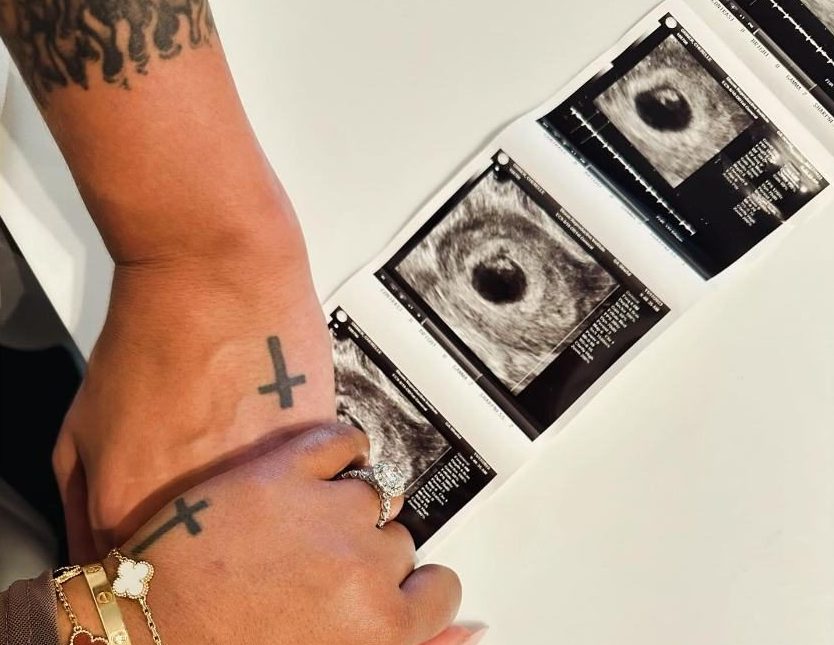
One year after returning to the WNBA after her release from a Russian gulag and declaring, “I’m never playing overseas again,” Phoenix Mercury star Brittney Griner and her wife announced they have something even bigger coming up this summer.
Cherelle, 31, and Brittney, 33, are expecting their first child in July. The couple shared the news with their 715,000 followers on Instagram.
“Can’t believe we’re less than three months away from meeting our favorite human being,” the caption read, with the hashtag, #BabyGrinerComingSoon and #July2024.
Griner returned to the U.S. in December 2022 in a prisoner swap, more than nine months after being arrested in Moscow for possession of vape cartridges containing prescription cannabis.
In April 2023, at her first news conference following her release, the two-time Olympic gold medalist made only one exception to her vow to never play overseas again: To return to the Summer Olympic Games, which will be played in Paris starting in July, the same month “Baby Griner” is due. “The only time I would want to would be to represent the USA,” she said last year.
Given that the unrestricted free agent is on the roster of both Team USA and her WNBA team, it’s not immediately clear where Griner will be when their first child arrives.
The Griners purchased their “forever home” in Phoenix just last year.
“Phoenix is home,” Griner said at the Mercury’s end-of-season media day, according to ESPN. “Me and my wife literally just got a place. This is it.”
As the Los Angeles Blade reported last December, Griner is working with Good Morning America anchor Robin Roberts — like Griner, a married lesbian — on an ESPN television documentary as well as a television series for ABC about her life story. Cherelle is executive producer of these projects.
Next month, Griner’s tell-all memoir of her Russian incarceration will be published by Penguin Random House. It’s titled “Coming Home” and the hardcover hits bookstores on May 7.
Sports
Applause and criticism for Staley’s trans-inclusive stance
South Carolina Gamecocks women’s coach made comments on Sunday
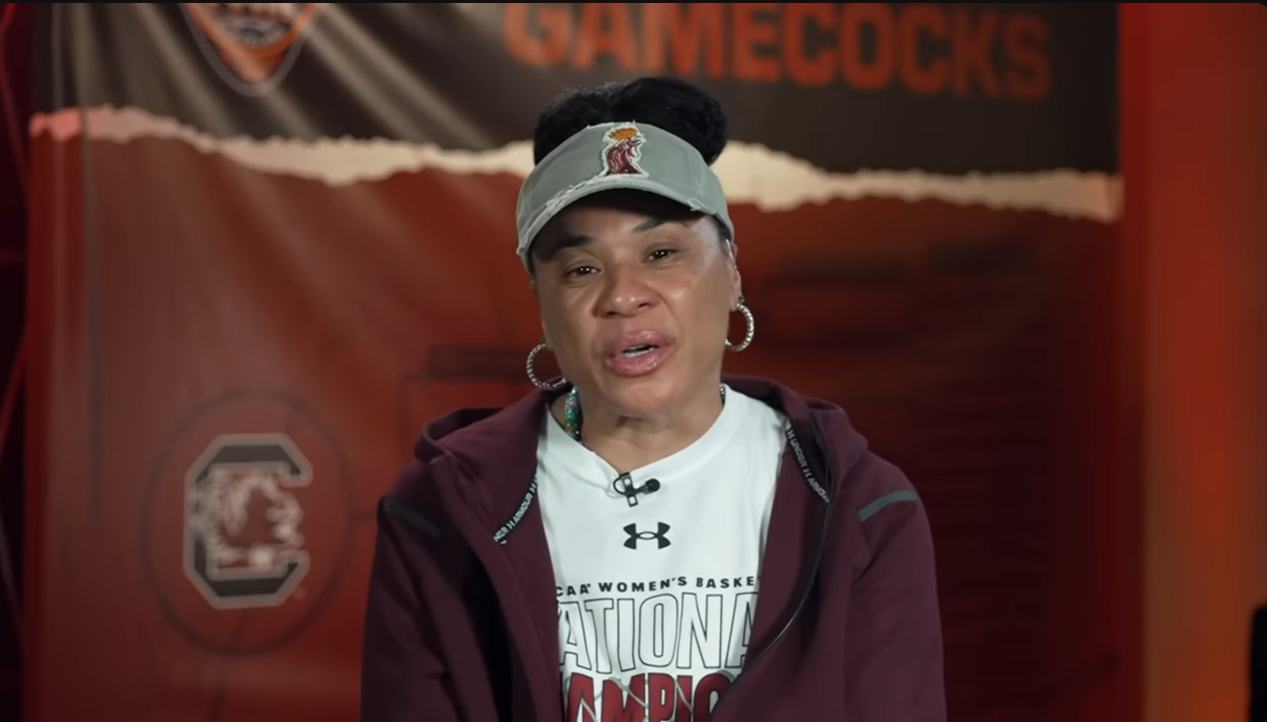
If not for a conservative transphobic blogger, this moment should be a celebration of NCAA women’s basketball coach Dawn Staley and the women of the South Carolina Gamecocks.
On Sunday, they concluded their undefeated season with a decisive win and a championship title. But when Staley faced reporters before that big game, Outkick’s Dan Zakheske asked her an irrelevant, clickbait question about transgender women in sports, referring to them as “biological males.”
Staley could have ignored the question, or stated she had no opinion, but instead the legendary coach offered a crystal clear endorsement of trans women competing in women’s sports, something outlawed in her home state of South Carolina for girls in kindergarten through college.
“I’m of the opinion,” said Staley, “If you’re a woman, you should play. If you consider yourself a woman and you want to play sports or vice versa, you should be able to play. That’s my opinion.”
Zakheske clearly wasn’t satisfied with that declaration of allyship and Staley swiftly cut him off.
“You want me to go deeper?” she asked.
“Do you think transgender women should be able to participate,” he started to say, when the coach stole the ball and took it downtown on a fastbreak. “That’s the question you want to ask? I’ll give you that. Yes. Yes. So, now the barnstormer people are going to flood my timeline and be a distraction to me on one of the biggest days of our game, and I’m okay with that. I really am.”
Staley is herself a Hall of Fame player a leading voice for diversity.
Reaction to her comments were swift, from LGBTQ rights organizations, athletes and inclusion opponents.
“Coach Staley simply spoke the truth that trans women are women and should play if they want,” said Sarah Kate Ellis, president and CEO of GLAAD, in a post on Instagram. “All of us can take a page from Coach Staley’s playbook as a sports leader and as a person of high integrity guided by faith, compassion and common sense.”
A White House pool reporter revealed President Joe Biden called Staley Sunday evening to congratulate her and the Gamecocks on their championship win. But it’s not clear if she and the president, an outspoken supporter of trans rights, discussed her remarks on trans athletes.
A number of Black leaders in the LGBTQ movement applauded Staley for taking a stand.
“Coach Staley has always been a trailblazer, but she’s also shown that true leadership is about advancing justice and equality for everyone,” said Human Rights Campaign President Kelley Robinson. “By expressing her full-throated support for transgender athletes’ inclusion in sports, she’s sending an important message — our shared humanity matters.
“Coach Staley showed courage and vulnerability, in choosing to answer the question and make a powerful statement of support for trans people on one of the biggest days and biggest stages in sports history,” said Kierra Johnson, executive director of the National LGBTQ Task Force, in a statement. “Not only does that make her a leader we can all aspire to like, it makes her a class act. She has etched her legacy in the history books with her play, her coaching, her heart and her smarts.”
In congratulating Staley on her championship title victory, Dr. David J. Johns, the CEO and executive director of the National Black Justice Coalition, also commended her for “her unwavering advocacy and support for transgender people in sports.”
“In a time when transgender athetes face unjust scrutiny, discrimination and exclusion from the National Association of Intercollegiate Athletics, her courage to speak truth to power and in support of inclusion and fairness sets a powerful example for us all, and is a testament to her integrity and compassion.”
The NBJC leader was referring to Monday’s announcement by the NAIA, the governing body of athletic programs at small colleges nationwide, voting 20-0 to essentially ban trans women from competing with other women beginning Aug. 1, as ESPN reported.
“It is a shocking and devastating development that the NAIA, an organization that has done so much to open doors, is now slamming those doors shut on transgender athletes,” said Sasha Buchert, Lambda Legal’s senior attorney and director of the organization’s nonbinary and trans rights project.
“Instead of standing up in support of transgender young people, the NAIA has simply turned its back on them — permanently depriving them of the benefits of competition. Would that they had the courage of victorious University of South Carolina women’s basketball coach Dawn Staley, who didn’t miss a beat in clarifying that transgender women should be able to play.”
However, praise for Staley’s stance was not universal.
Riley Gaines, failed former college swimmer and paid shill for the anti-inclusion organization, Independent Women’s Forum, called Staley “entirely incompetent or a sell-out” on Fox News. “Personally, I don’t think she believes what she said.”
Gaines has turned her fifth-place tie with out trans NCAA champion Lia Thomas into a career as a crusader against inclusion and a former advisor to the presidential campaign of Florida Gov. Ron DeSantis.
Val Whiting, a former Stanford University and professional women’s basketball player, tweeted her strong disagreement with Staley. “A lot of my basketball sisters feel differently but trans women do not belong in women’s sports. It’s not fair nor safe for biological women. There has to be another solution for trans women to be able to compete athletically besides having them compete against biological women.”
A lot of my basketball sisters feel differently but trans women do not belong in women’s sports. It’s not fair nor safe for biological women. There has to be another solution for trans women to be able to compete athletically besides having them compete against biological women.
— Val Whiting (@iamcoachval) April 7, 2024
Zaksheske’s Outkick colleague, anti-trans pundit David Hookstead, also went all-in with a transphobic post.
“Dawn Staley says she supports men who identify as women competing against real women in sports. Her view could literally destroy women’s basketball forever. Why won’t more people stand up for women?”
Dawn Staley says she supports men who identify as women competing against real women in sports.
— David Hookstead (@dhookstead) April 6, 2024
Her view could literally destroy women’s basketball forever.
Why won’t more people stand up for women? pic.twitter.com/2A59KTqvHb
Hookstead then boasted that Staley blocked his account.
Republican South Carolina Congresswoman Nancy Mace retweeted Zaksheske’s account of his interaction with Staley, calling her support of trans athletes “absolute lunacy.” That in turn won praise from Caitlyn Jenner, who retweeted Whiting and posted her thanks to Mace, along with this comment: “There is nothing complicated about this issue!”
What is complicated is that Jenner has never explained why she has competed with cisgender women in golf ever since her transition almost a decade ago.
You’re a hypocrite. pic.twitter.com/42DKwA9jmF
— Art Candee 🍿🥤 (@ArtCandee) April 7, 2024
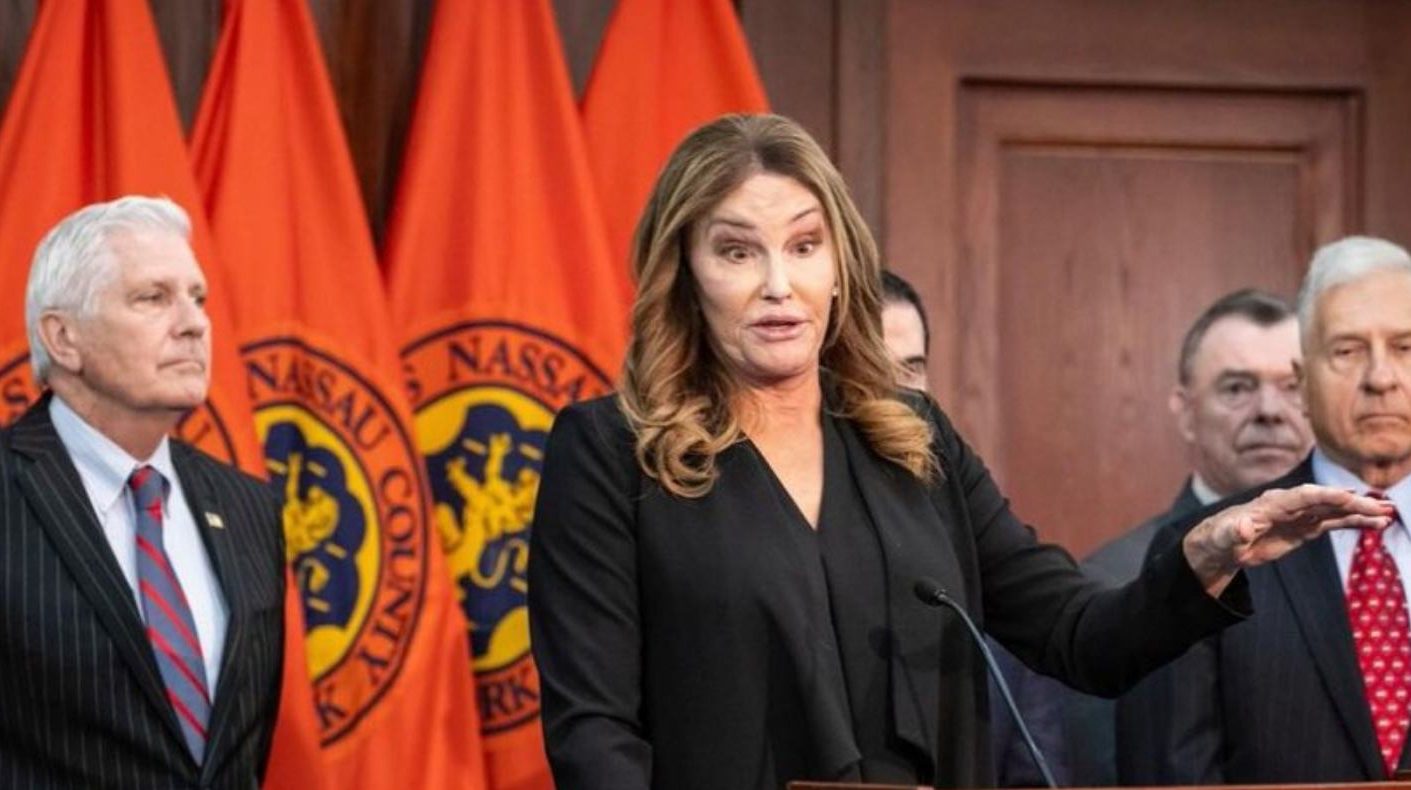
Caitlyn Jenner flew from Malibu to New York this week to join her fellow Republicans in their nationwide quest to keep transgender girls and women from competing in sports with other women.
“Let’s stop it now while we can,” said the Olympic gold medalist, at a news conference carried live by Fox News Channel.
Republican Nassau County Executive Bruce Blakeman organized the event so that Jenner could speak in support of his February executive order banning trans athletes at more than 100 county-owned facilities.
“Trans women are competing against women, taking valuable opportunities for the long-protected class under Title IX and causing physical harm,” said Jenner without providing supportive evidence of her claim. Jenner said the ban would defeat “the woke agenda.”
Her comments drew praise from former NCAA swimmer and paid shill Riley Gaines, who represents the Independent Women’s Forum and has also worked with the failed presidential campaign of Republican Gov. Ron DeSantis of Florida on his anti-trans athlete platform.
We stand with Executive Blakeman as he faces shameful retaliation from @TishJames for merely protecting sports on the basis of sex
— Riley Gaines (@Riley_Gaines_) March 18, 2024
Thanks to you both, @Caitlyn_Jenner @NassauExec !!👏🏼 https://t.co/vAsWfayI7l
“If the left wants to fight this battle on this hill, it’s a losing battle,” said Jenner. “We will win the battle.” She claimed she spoke on behalf of women and girls, contradicting her past statements in support of trans girls competing according to their gender identity and despite the fact she herself still competes in women’s sports.
Shortly after the ban was announced last month, New York State Attorney General Letitia James and New York Gov. Kathy Hochul, both Democrats, denounced it and accused Blakeman of “bullying trans kids.”
James called the order “transphobic and deeply dangerous,” and argued that it violates the state’s anti-discrimination laws. The state attorney general challenged it in court March 1 with a “cease and desist letter,” demanding that Blakeman rescind the order, saying it subjects women’s and girls’ sports teams to “invasive questioning.”
As the Los Angeles Blade reported, Blakeman’s legal team countered with its own lawsuit on March 5, claiming her cease and desist letter violates the 14th Amendment’s equal protection clause.
“Not only was the executive order legal, but we had an obligation to defend it,” Blakeman said Monday.
The order has also been challenged by the New York Civil Liberties Union, which filed suit last week on behalf of a women’s roller derby league based in Nassau County that welcomes trans women and would be barred from using the county’s facilities by Blakeman’s executive order.
Just days before the Long Island news conference, Jenner joined Olympian Sharron Davies, who also campaigns against trans inclusion in sports, for an conversation with a British newspaper, the Telegraph, which has been outspoken against trans inclusion.
They recalled that in their day, tests to determine sex were mandatory in order to compete, and Jenner said she has been “pushing” for sex tests to return to sports, decades after sports organizations around the world abandoned the practice because they were unreliable. “If they continue down this road, it will be pretty much the end of women’s sport as we know it.”
“I can still hit a golf ball 280 yards,” Jenner continued, not mentioning she plays from the ladies’ tee. She did however opine about not being “a real woman,” acknowledging that many trans women disagree with her view.
“They keep saying, ‘Oh, I’m a real woman, I’m a real woman,’ and I’m going, ‘No, you’re not,’” said Jenner. “I will use your preferred pronouns, I will treat you as a female, you can run and dress and do whatever you want, I have nothing against that, it’s fine, but biologically you’re still male.”
She added: “Let me explain — I am biologically male, OK? I’m XY. There’s nothing I can do to change that. If you believe in gender dysphoria, and I think most people do realize it’s not a disease, it’s a mental condition, just like some people are left-handed and some people are right-handed, it’s kind of the way you’re born and I’ve dealt with it my entire life.“
“I consider myself a trans person, I am still genetically male, I changed all of my ID right down to my birth certificate so technically yes, I am female, but on the other hand I know I’m not.”
Related:
-

 Africa4 days ago
Africa4 days agoCongolese lawmaker introduces anti-homosexuality bill
-

 World4 days ago
World4 days agoOut in the World: LGBTQ news from Europe and Asia
-

 District of Columbia3 days ago
District of Columbia3 days agoReenactment of first gay rights picket at White House set for April 17
-

 Africa3 days ago
Africa3 days agoUgandan activists appeal ruling that upheld Anti-Homosexuality Act

